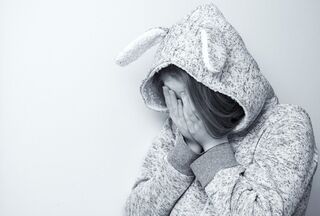Integrative Medicine
The Inflamed Teenage Brain
Integrative medicine offers a new answer to adolescent mental health symptoms.
Posted March 3, 2021 Reviewed by Gary Drevitch
Every generation of psychology and psychiatry has proposed an answer to why teenagers are so moody, angry, anxious, surly, irritable, impulsive and prone to experimenting with drugs or alcohol.
Developmental psychologists, like psychoanalyst Erik Erikson, claimed that teens are separating and individuating from their parents, trying to establish their own identities. Teens experiment with different lifestyles and roles, often very different from the ones their parents set out for them. When parents try to interfere with their new identity formation, teens get sullen and explosive. The treatment was family therapy.

In 1980, the new field of biological psychiatry proposed that mental illnesses were the causes of symptoms like anxiety, sadness, and substance abuse. In the various editions of psychiatry’s Diagnostic and Statistical Manual of Mental Disorders, mental disorders were viewed as culprits for the woes of adolescents. Psychiatric medications like anti-depressants, or even anti-psychotics, were offered as the appropriate cures.
Then, in the late '90s, the era of the brain set in. Neuroscientists claimed that that the frontal cortex of the brain does not mature until the twenties. Teens behave and misbehave the way they do because the thinking part of their brains is not yet fully developed. Meditation and mindfulness were preferred as effective ways to soothe teen angst until their brains matured.
In the past few years, an innovative approach to what we think of as psychiatric symptoms has been gathering steam. This is integrative medicine, sometimes called psycho-neuro-immunology. In brief, this approach may be described as a focus on the gut-brain-immune system connection. The immune system and the mind are intimately connected, claims this school of thought, which includes doctors like Mark Hymen, Steven Gundry, and endocrinologist Sarfraz Zaidi. Major universities started to include departments of psycho-neuro-immunology in their medical schools. The focus is on diet, supplements like Vitamin D, and alternative medicine like acupuncture.
Riding the tsunami of integrative medicine is a new book by Kenneth Bock, which applies the integrative approach to teenage mental illness: Brain Inflamed: Uncovering the Hidden Causes of Anxiety, Depression and Other Mood Disorders in Adolescents and Teens. From his own considerable clinical experience, Bock claims that a disturbance of the balance of the gut-brain-immune system axis causes inflammation. And, he argues, much of what we call mental disorders in young people can be traced to this inflammation.
This is not an unfamiliar idea. In Susannah Cahalan’s 2013 memoir, Brain on Fire: My Month of Madness, we learn how her diagnosis of severe psychosis turned out to be an autoimmune inflammation of her brain. She suffered unsuccessful and severe treatments for psychosis before the real cause of her madness was found—in her immune system, not her psyche. Cahalan's terrifying experience is an example of what happens when psychiatric diagnoses are made on the basis of symptoms alone, while the real cause of the symptoms--in this case physical disease--is overlooked.
One fairly typical hidden connection that Bock discusses is that of teen depression and autoimmune thyroid disease. Often what seems like depression in a teen is traceable to an autoimmune thyroid disorder called Hashimoto’s Disease. With Hashimoto’s, the body’s immune system attacks the thyroid, causing inflammation and low thyroid hormone output. The cure for depression in this case is not an anti-depressant medication--which will not help at all--but a gluten-free diet, extra vitamin D3, reduced stress, and, if needed, synthetic thyroid hormone. I have come across this situation myself with symptoms of depression in teenage girls. Especially if the client's depression is accompanied by low energy and brain fog, I recommend that her thyroid levels be checked with a blood test. In a number of my adolescent clients, their depression was caused by low thyroid hormone output due to Hashimoto’s disease.
Bock makes many interesting connections. For example, I have known for many years that acupuncture helps the immune system. Recently, for example, I recommended acupuncture to a client who had irritable bowel disease, an autoimmune condition. I couldn’t explain how acupuncture helps autoimmunity, but my experience has taught me that it does. Bock makes the connection through endorphins: Acupuncture modulates endorphins, which are one kind of messenger molecule for the nervous system. And the immune system’s T-cells have receptors for endorphins. Therefore, acupuncture can affect T cells, which has a profound effect on the immune system.
Bock’s message is that before a psychiatric diagnosis is made for a young person, physical illnesses—and in particular the elusive space of autoimmune illnesses—should be explored and ruled out. Bock is openminded about social context causes of stress. He acknowledges that what is troubling a child or teen may not be a medical issue at all, but a purely psychosocial one.
Thinking seriously about auto-immune diseases as a possible cause of symptoms like depression and anxiety in teens is a valuable tool for the therapist, when used along with considering developmental, psychosocial, and psychiatric possibilities as causes for the symptoms.




